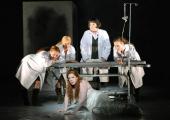Rusalka, Opera North

Welcome revival for a sharp production of Dvorak's fairytale
A thousand miles away from the Disney version, the transformation scene in Dvořák’s Rusalka is bleak and terrifying. With not a cauldron, bat or cobweb to be seen, the heroine is strapped to an operating table before imbibing the witch’s magic potion intravenously. Then her legs, until now swaddled together, are literally torn apart. It’s a brutal, shocking moment; no surprise that some audience members giggled nervously.


